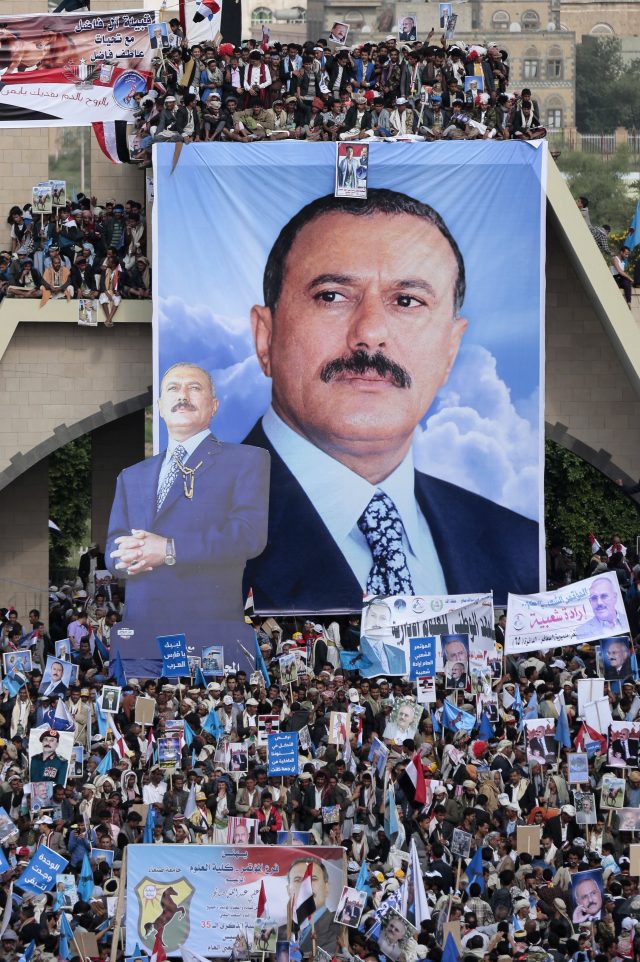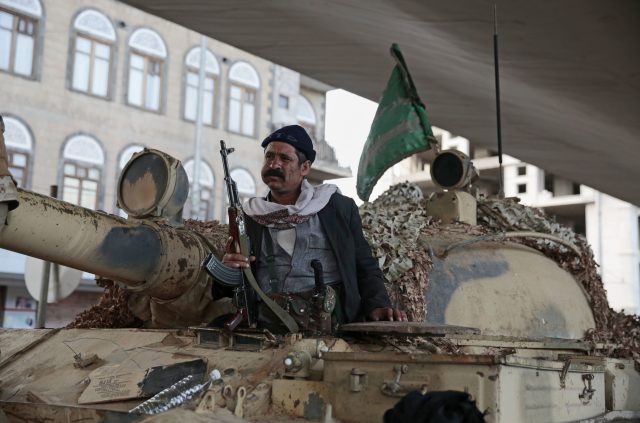
President Abed Rabbo Mansour Hadi has urged Yemenis to unify against the country’s Shiite Houthi rebels, describing them as “Iranian militias” and a “nightmare”.
Mr Hadi, who has been in self-imposed exile in Riyadh in recent past years, delivered his televised speech hours after the Houthis killed their onetime ally, former president Ali Abdullah Saleh.
Mr Saleh’s forces and Houthis joined ranks in 2014 against Mr Hadi’s government, forcing him to seek military intervention by his Gulf neighbours.
When the Saleh-Houthi alliance began to unravel, Mr Hadi offered the opportunity of a fresh start in relations with Mr Saleh, days before his death.
“Yemen is passing through a decisive turning point that needs our unity and steadfastness in the face of these sectarian militias,” Mr Hadi said, referring to the Houthis.
 Supporters of former Yemeni President Ali Abdullah Saleh, who ruled for more than three decades (Hani Mohammed/AP)
Supporters of former Yemeni President Ali Abdullah Saleh, who ruled for more than three decades (Hani Mohammed/AP)
He offered condolences for the death of Mr Saleh, describing him and others who were killed in the past days of clashes as “martyrs”.
“Let’s put our hands together to end this nightmare,” said Mr Hadi, who succeeded Mr Saleh in 2012. He added that government forces would support an “uprising” against the Houthis in Sanaa.
Mr Saleh, Yemen’s former president and long-time strongman, has been killed as his loyalists and Shiite rebels battled for control of the capital.
A video circulating online purported to show Mr Saleh’s body, his eyes open but glassy, motionless with a gaping head wound, as he was being carried in a blanket by rebel fighters chanting “God is great” who then dumped him into a pickup vehicle. Blood stained his shirt under a dark suit.
Circumstances of his death remained unclear but some officials said rebels killed him as he tried to leave the capital.
Mr Saleh’s death was announced on Monday by the rebels, known as Houthis, who have been fighting Mr Saleh’s forces for the past week.
Two of Mr Saleh’s associates and a third official from the government of Yemen’s internationally recognised president, Mr Hadi, confirmed the death.
 A Houthi Shiite fighter rides on a tank while guarding a street leading to the residence of former Yemeni president Ali Abdullah Saleh, in Sanaa, Yemen (Hani Mohammed/AP)
A Houthi Shiite fighter rides on a tank while guarding a street leading to the residence of former Yemeni president Ali Abdullah Saleh, in Sanaa, Yemen (Hani Mohammed/AP)
His death and the fighting between his supporters and the Houthis puts the civil war on an unpredictable path.
Mr Saleh allied with the Houthis in the years after he was ousted from power in 2011, and the support of his loyalist military units was key to helping the Houthis overrun the capital, Sanaa, in 2014, driving out Mr Hadi’s government.
But in recent months, the alliance frayed amid Houthi suspicions Mr Saleh was leaning toward the Saudi-led coalition backing Mr Hadi.
Mr Hadi’s forces, trying to take advantage of the collapse of the alliance, announced they would march on Sanaa. But even without Mr Saleh’s loyalists, the rebels remain a powerful force.
“The leader of treason has been killed,” Houthis’ TV network al-Masriah said.
Several Houthi military officials said Mr Saleh was killed as he headed along with top party leaders from Sanaa to his hometown of Sanhan, nearby.
Houthi fighters followed him in 20 armoured vehicles, attacked and killed him and almost all those with him, the officials said.
A Houthi media official, Abdel-Rahman al-Ahnomi said Houthi fighters killed Mr Saleh as he tried to flee to Saudi Arabia though the province of Marib, to the east of the capital.
Mr Saleh ruled Yemen for more than 30 years. He was forced to resign after months of protests against him during an Arab Spring uprising in 2011.


Why are you making commenting on The Herald only available to subscribers?
It should have been a safe space for informed debate, somewhere for readers to discuss issues around the biggest stories of the day, but all too often the below the line comments on most websites have become bogged down by off-topic discussions and abuse.
heraldscotland.com is tackling this problem by allowing only subscribers to comment.
We are doing this to improve the experience for our loyal readers and we believe it will reduce the ability of trolls and troublemakers, who occasionally find their way onto our site, to abuse our journalists and readers. We also hope it will help the comments section fulfil its promise as a part of Scotland's conversation with itself.
We are lucky at The Herald. We are read by an informed, educated readership who can add their knowledge and insights to our stories.
That is invaluable.
We are making the subscriber-only change to support our valued readers, who tell us they don't want the site cluttered up with irrelevant comments, untruths and abuse.
In the past, the journalist’s job was to collect and distribute information to the audience. Technology means that readers can shape a discussion. We look forward to hearing from you on heraldscotland.com
Comments & Moderation
Readers’ comments: You are personally liable for the content of any comments you upload to this website, so please act responsibly. We do not pre-moderate or monitor readers’ comments appearing on our websites, but we do post-moderate in response to complaints we receive or otherwise when a potential problem comes to our attention. You can make a complaint by using the ‘report this post’ link . We may then apply our discretion under the user terms to amend or delete comments.
Post moderation is undertaken full-time 9am-6pm on weekdays, and on a part-time basis outwith those hours.
Read the rules here